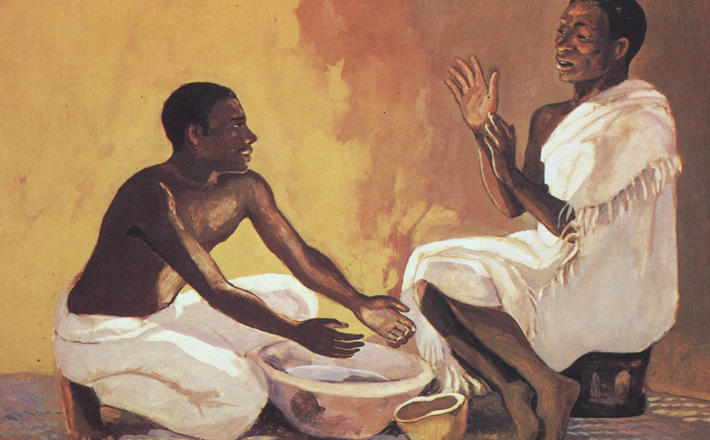Commentary on Exodus 12:1-4 [5-10] 11-14
“This month shall mark for you the beginning of months; it shall be the first month of the year for you” (Exodus 12:2).
This is how the narrator of Exodus 12 begins the description of the Passover event. It is a new beginning for God’s people. A defining moment for the nation of Israel. No longer slaves in Egypt, they are now people marked by the blood of the lamb, rescued, redeemed, and claimed as God’s own. And every year, beginning with that first Passover, Israel was to celebrate it at the start of the year as a festival to the Lord, a festival that served to remind them again of who and whose they were.
The liturgical quality of the narrative points to its sacramental nature. Exodus 12 does not simply tell of a moment in history, but provides the script for an event that would be rehearsed and re-enacted yearly (verse 14). The Passover was to become part of the natural rhythms of Israel’s life together and life with God, an annual commemoration and celebration of God’s redemptive grace to Israel.
At the center of this sacramental narrative is the blood, a sign and seal of God’s steadfast love and covenant commitment to the Hebrew people. A common perception is that the blood was a marker for the angel of death to know which houses to pass over. However, this text describes the blood as a sign for the people (verse 13). Blood, in the ancient near east, was sacred and signified the life or life-force of living creatures, making it an apt sign and symbol here. Painting the blood on the doorposts becomes the act by which the people receive and accept God’s gracious promise for life in the face of death and darkness, signaling their acceptance of God’s redemptive act.
In addition to this sacramental quality of the Passover event described here, a number of additional features are worth noting. First, as the narrator describes the feast of the lamb, a concern is expressed about the appropriate number of people gathered (verse 4). The focus of the narrator’s comments, however, are not on whether there will be enough of the sacrificed lamb to go around, but on whether there will be too much, that is, whether there will be enough people gathered around the table to partake in the feast. The comment suggests two things. One, the expectation that the entire lamb be consumed and that there be nothing left remaining. The sacrificial and sacramental meal is not to be saved until morning or taken with them.
This is no ordinary meal as Israel prepares to leave Egypt. It is sacred and special and belongs to a moment that marks a new beginning in their life with God, a God who has heard their cries and responded with love and compassion. Two, there is an unmistakable insistence that more people be gathered in, that the table be enlarged, that God’s grace not be limited to a few but that it is big enough and great enough to cover all who are ready to receive it.
One last feature of this text is worth noting—the people are to eat in haste, with their cloaks tucked into their belts and their sandals on their feet.The narrator presents the Passover celebration as a prologue to what lies ahead and as such, it functions to focus the attention of the people on what God is going to do next. It draws the Israelites’ gaze to the future, fostering a sense of curiosity, wonder, and hope about their life with God beyond Egypt. Egypt is their past but it is not their future. Weeping is but for a night but joy will come in the morning (Psalm 30:5).
Today, as we commemorate Jesus’ last supper with his disciples, the breaking of bread and the pouring out of the wine, the fellowship they shared in anticipation of Jesus’ darkest moment when death overtook him, we also need the reminder that our weeping is for a night but joy will come in the morning. Like the Passover, the Lord’s Supper is a sign and seal of God’s covenant promises, that through Christ’s death, we are rescued, redeemed, and claimed by God as God’s own.
As Christians, this sacramental meal marks our new beginning. Against the backdrop of death, Christ’s death, through a mystery that we cannot fully understand, we have life. Thus, while we weep over Christ’s suffering and death and our sin and shame for which he died, this commemoration also invites us to look ahead with curiosity, wonder, and hope, about our life with God as new creations. Death is not the end, but the beginning of something new. For Christ has died, Christ is risen, Christ will come again!


April 14, 2022